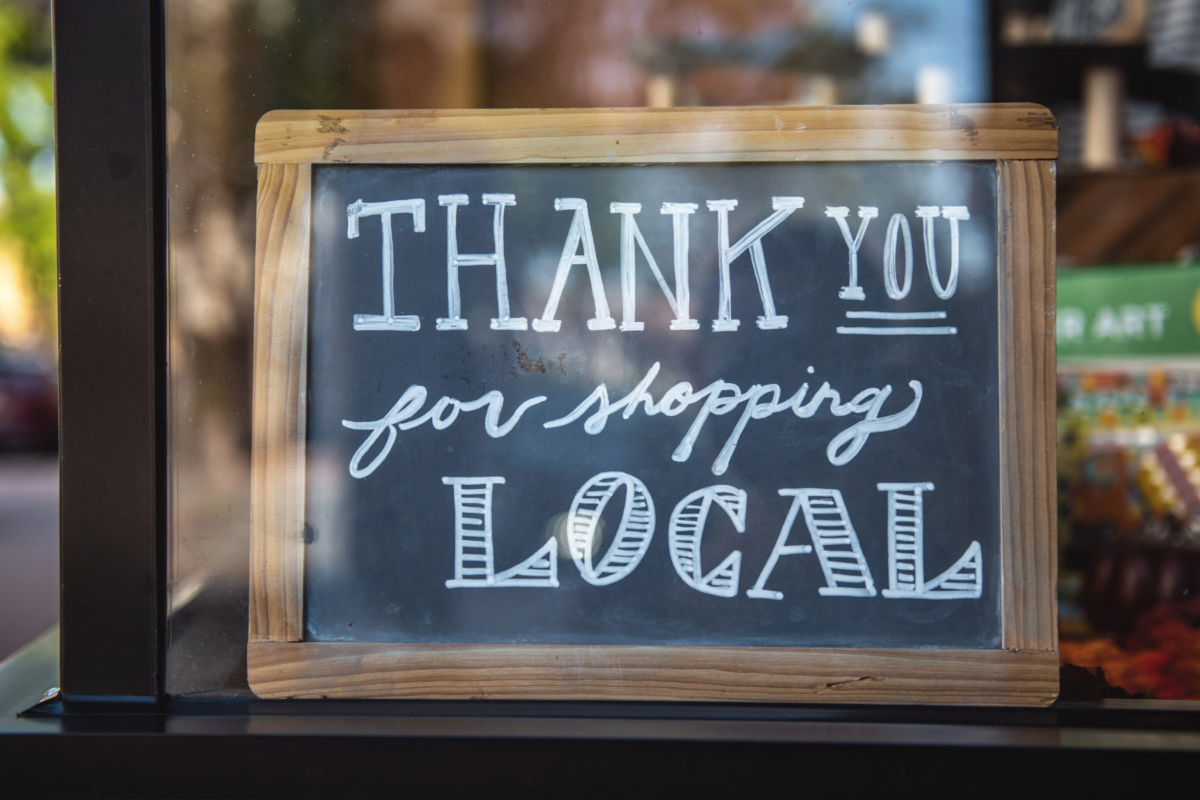
In an article published on Religion News Service, ROSA LEE HARDEN, executive producer of Faith+Finance, calls for us to reflect “on not just why we give gifts but how we purchase them”…
In the church I grew up in, the congregation managed all decisions about repairs or needs of the church by getting bids and selecting the provider with the lowest price. This was what we would do if it was our money, and we were expected to be even more careful with the church’s funds.
What we did not do is talk through the impact of our decisions. Where were supplies coming from and how did that impact the people around us? Who were the laborers? Was our decision just about the church’s budget, or could it have been about being the church in our community?

A sign reading “Thank you for shopping local” is displayed in a store window. PICTURE: Tim Mossholder/Unsplash/Creative Commons.
I think about this as Black Friday approaches this year. Already, before Thanksgiving, much less Christmas, we are inundated with advertisements urging us to buy early, buy cheap, buy now. Big-box stores, competing for our money, are lowering prices on popular items to woo us through their doors.
This is a strange way to prepare to celebrate the birth of Jesus, a child born in a stable. At Christmas as perhaps no other time of year, we disconnect our money from our faith. But all year long we treat our faith and our finances as if they are separate.
“Already, before Thanksgiving, much less Christmas, we are inundated with advertisements urging us to buy early, buy cheap, buy now. Big-box stores, competing for our money, are lowering prices on popular items to woo us through their doors. This is a strange way to prepare to celebrate the birth of Jesus, a child born in a stable. At Christmas as perhaps no other time of year, we disconnect our money from our faith. But all year long we treat our faith and our finances as if they are separate.”
There is a way for us to take our finances and our faith more seriously. At a church I attended as an adult, we often hosted speakers. A member of the church who owned a small bookstore ordered books from the author and brought them to the events so that anyone in attendance who wanted could purchase a copy and have it signed. Some members bought their books online, perhaps for a few pennies less, and bypassed our neighbor.
Soon, we learned that the small bookstore was struggling and this member of our church was close to losing his livelihood. When we learned this, many of us started buying our books at his store again, and spread the word. In the end, his small bookstore stayed open.
This is what happens when we reconnect our faith with our finances, when we see our money as a reflection of our morals.
When I talk about these things, I’m often told, “Yes, but big-box stores employ people locally.” And they do. But big corporations also put small, locally owned stores out of business. They are driven solely by profit. They are built to put money into the pockets of the top one per cent. Online behemoths, for their part, are built to send their CEOs to the moon.
Fifteen cents of every dollar spent at a big-box stays in our community, while 45 cents of every dollar spent at a small business stays in our community. Additionally, a dollar spent online leaves our local communities immediately, while dollars spent with local merchants turn over seven times before leaving the community.
As the Christian narrative enters our lives again, let’s reflect on not just why we give gifts but how we purchase them.
Let’s think about the gifts themselves. Some 80 per cent of things sold in stores, made with plastics that are harmful for our environment or with other cheap materials, are made to be obsolete within months. They are frequently made by exploited labour. And they are sold to us by businesses that are being dishonest with their workers, that don’t provide for their workers anything more than the market demands.
This free-market economy and the consumerism it has nurtured are not a reflection of all that we hold sacred. They are not a reflection of God’s economy.
At the Eucharistic table, we are reminded that there is enough. But when we leave that table at this time of year, are we participating in an economy that is interested in making sure there is enough for everyone? Or is it interested in more for the people who already have more than enough, and less for those who do not? What would happen if we thought about every dollar we spend this season as an expression of our faith?
We would spend differently. Would we spend our money in ways that help create a more just local economy, in ways that begin to address the racial wealth disparity and the needs of our neighbors? From what I understand of Scripture, that seems like a more fitting way to celebrate the birth of Christ.
Rev Rosa Lee Harden is executive producer of Faith+Finance. She was a co-founder of SOCAP, the largest conference on investing for social good, and served as canon for money and meaning at the Cathedral of All Souls in Asheville, North Carolina.





